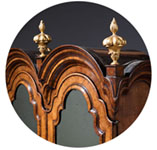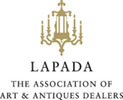Fine Brass Pocket Sundial and Compass by Michael Butterfield Paris
Sold
Request Information
Follow Us
Fine Brass Pocket Sundial and Compass by Michael Butterfield Paris
A fine brass Anglo-French octagonal pocket sundial with compass by Michael Butterfield, circa 1700.
The sundial can be used anywhere between latitudes of 40° and 60° covering Southern Spain and Italy north to Scandinavia. The elaborately engraved base plate has various Roman chapter rings with subdivisions on which the folding hinged gnomon (a triangular flap) casts its shadow. It is signed by the maker in the following manner: Butterfield A Paris. On one side is a glazed recessed compass, with a blued steel hand, to position the instrument in such a way that the time can be read. The triangular gnomon is richly engraved and can be set for a particular latitude by sliding the gnomon up or down, the latitude being indicated by the beak of a figured engraved bird. The folding gnomon and cut corners enable the dial to be carried in the pocket.
The underside shows the latitudes of various European places, including London and Rome.
Its maker Michael Butterfield (b.1635, d.1724) was an English instrument maker who based himself in Paris for a time. These types of dials, often replicated by other makers, became known as Butterfield Dials. They were a fashionable and functional traveller’s accessory from the late 17th century onwards.
Interestingly, early watches did not keep time particularly well and a dial such as this were used to regularly set a watch. Anecdotally, sundials may also have been preferred to sounding timepieces whilst on the road – the chimes being thought to attract thieves.
Similar examples can be found in the British Maritime Museum, V&A and the British Museum.
Condition
Good. Wear consistent with age and use.
Dimensions
Height: 2.56 in. (6.5 cm)
Width: 2.29 in. (5.8 cm)
Depth: 0.32 in. (8 mm)
Literature
Tardy, Dictionnaire des horlogers français, Paris, 1971, p. 103
C. Cowham, A Dial in Your Poke, Cambridge, 2004, passim
H.Higton, Sundials, An Illustrated History of Portable Dials, London, 2001, passim
PREVIOUSLY SOLD
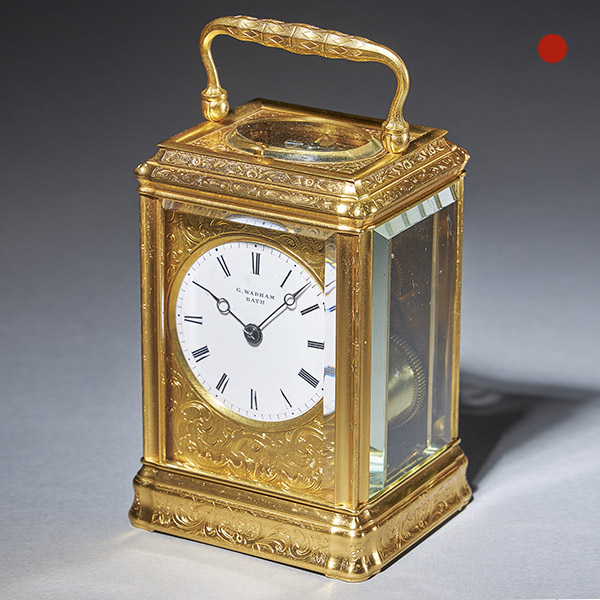
19th Century Gilt-Brass Engraved Striking and Repeating Carriage Clock
19th Century Gilt-Brass Engraved Striking and Repeating Carriage Clock Sold Follow Us19th Century Gilt-Brass Engraved Striking and Repeating Carriage Clock The superb engraved gilt brass gorge case has facetted glass panels to all sides so...
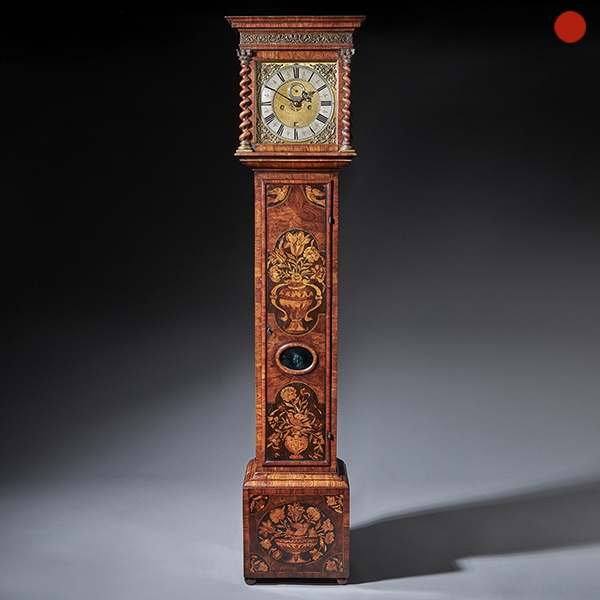
Important Charles II 17th Century Princes Wood and Marquetry Longcase Clock
Important Charles II 17th Century Princes Wood and Marquetry Longcase Clock SOLD Follow UsImportant Charles II 17th Century Princes Wood and Marquetry Longcase Clock A unique and important Charles II 17th century month-going Princes wood and...
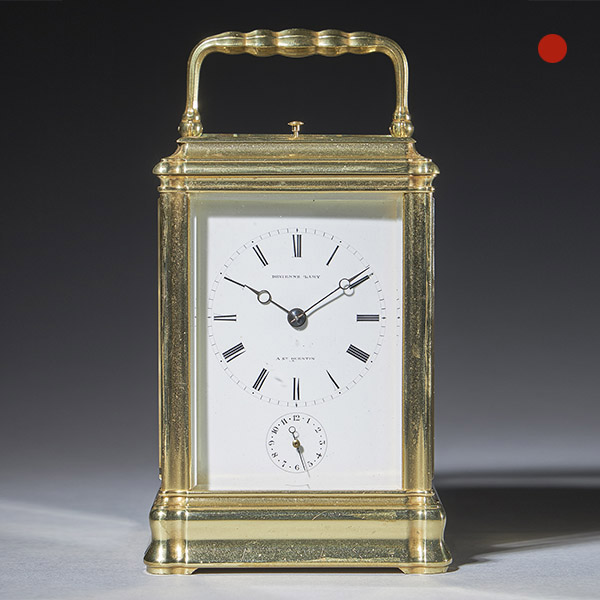
A Rare And Unusual 19th-Century Carriage Clock Signed Devienne Lamy A St Quentin, Circa: 1860
A Rare And Unusual 19th-Century Carriage Clock Signed Devienne Lamy A St Quentin, circa 1860. The gorge case has bevelled glass panels on all sides.
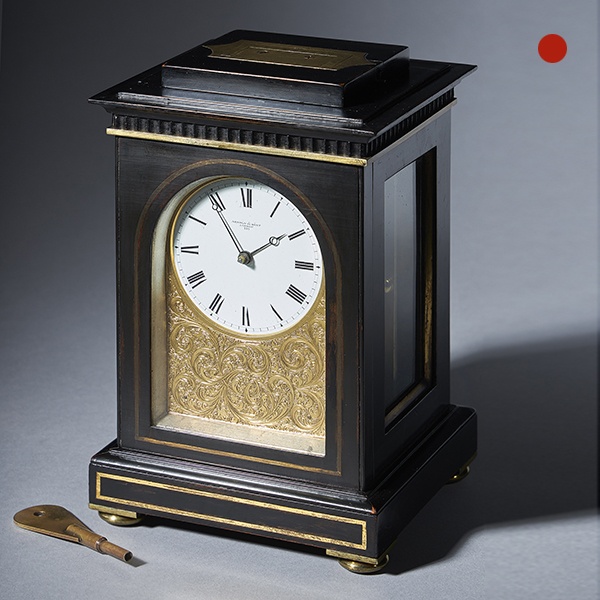
A Unique And Fine Mid 19th-Century Travelling Clock By Celebrated Makers Arnold & Dent, London
Unique and Fine Mid 19th-Century Travelling Clock By Celebrated Makers Arnold & Dent, London. The time is indicated by a fine pair of blued-steel Breguet hands.
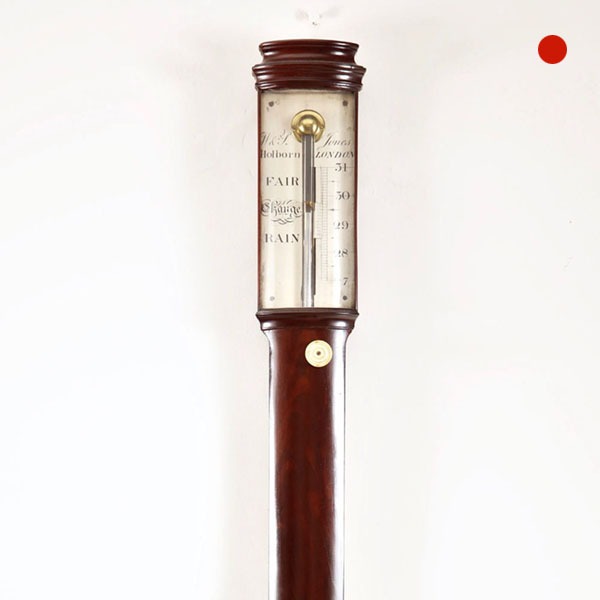
A fine 18th-Century George III mahogany bow-front stick barometer
The mahogany-veneered case has an austere form with only the moulded caddy top and the urn-shaped cistern cover to break its soberness. The silvered register plates are protected by a bowed glass, the recorder with vernier scale being operated by a knob below the register plate.
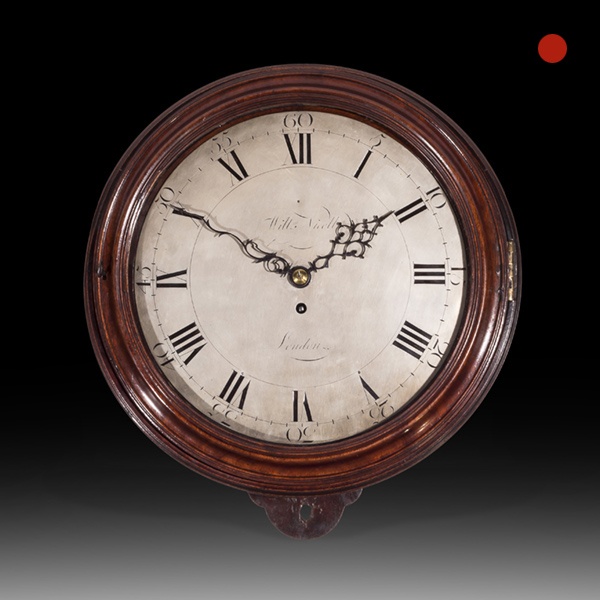
Large Mahogany 18th-Century Dial Clock, William Nicoll, London
The solid mahogany case has a moulded mahogany glazed door, which can be locked on the left-hand side. The original rectangular saltbox is permanently attached to the front and has doors to the side and the bottom.

19th Century Gilt-Brass Engraved Striking and Repeating Carriage Clock
19th Century Gilt-Brass Engraved Striking and Repeating Carriage Clock Sold Follow Us19th Century Gilt-Brass Engraved Striking and Repeating Carriage Clock The superb engraved gilt brass gorge case has facetted glass panels to all sides so...

Important Charles II 17th Century Princes Wood and Marquetry Longcase Clock
Important Charles II 17th Century Princes Wood and Marquetry Longcase Clock SOLD Follow UsImportant Charles II 17th Century Princes Wood and Marquetry Longcase Clock A unique and important Charles II 17th century month-going Princes wood and...

A Rare And Unusual 19th-Century Carriage Clock Signed Devienne Lamy A St Quentin, Circa: 1860
A Rare And Unusual 19th-Century Carriage Clock Signed Devienne Lamy A St Quentin, circa 1860. The gorge case has bevelled glass panels on all sides.

A Unique And Fine Mid 19th-Century Travelling Clock By Celebrated Makers Arnold & Dent, London
Unique and Fine Mid 19th-Century Travelling Clock By Celebrated Makers Arnold & Dent, London. The time is indicated by a fine pair of blued-steel Breguet hands.

A fine 18th-Century George III mahogany bow-front stick barometer
The mahogany-veneered case has an austere form with only the moulded caddy top and the urn-shaped cistern cover to break its soberness. The silvered register plates are protected by a bowed glass, the recorder with vernier scale being operated by a knob below the register plate.

Large Mahogany 18th-Century Dial Clock, William Nicoll, London
The solid mahogany case has a moulded mahogany glazed door, which can be locked on the left-hand side. The original rectangular saltbox is permanently attached to the front and has doors to the side and the bottom.
YOU MAY ALSO LIKE
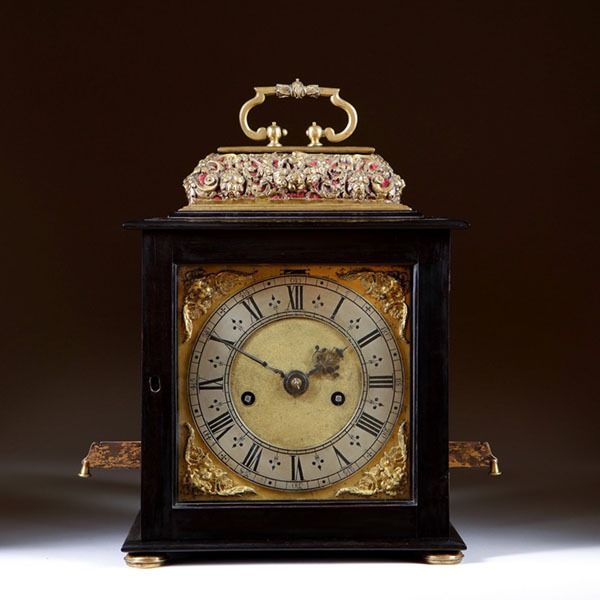
A Rare and Important Charles II 17th Century Table Clock by Henry Jones
A Rare and Important Charles II 17th Century Table Clock by Henry Jones £85,000Follow UsA Rare and...
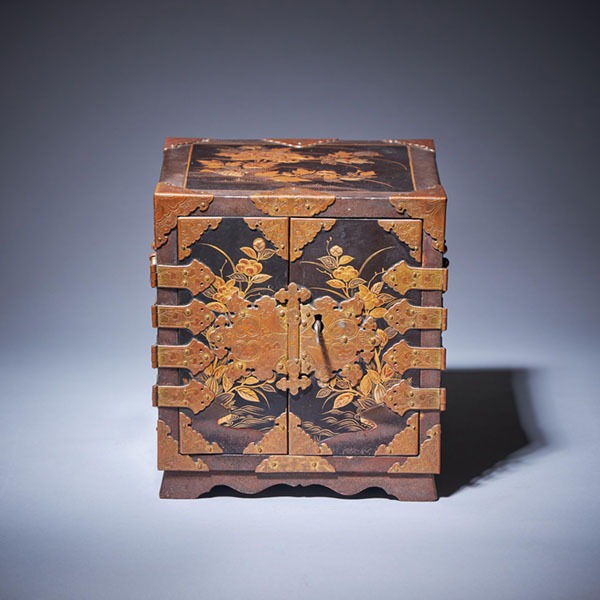
Important Early Edo Period 17th Century Miniature Japanese Lacquer Cabinet
Important Early Edo Period 17th Century Miniature Japanese Lacquer Cabinet £36,000Follow...
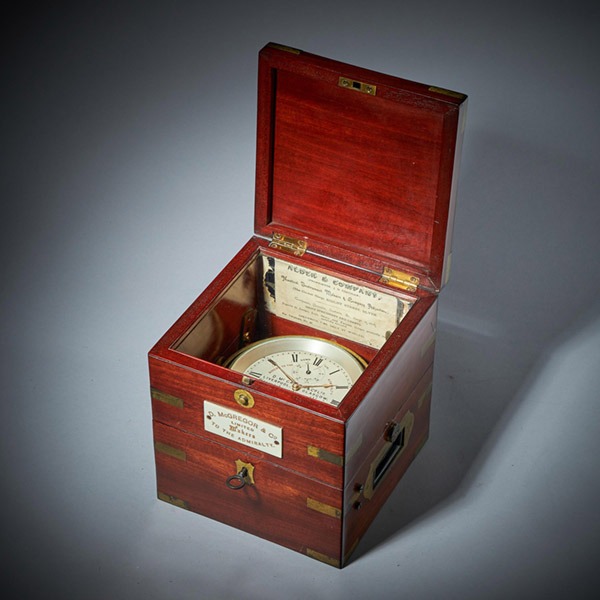
Fine Scottish Two-Day Marine Chronometer Signed and Numbered D. McGregor
Fine Scottish Two-Day Marine Chronometer Signed and Numbered D. McGregor £6,500Follow UsFine...
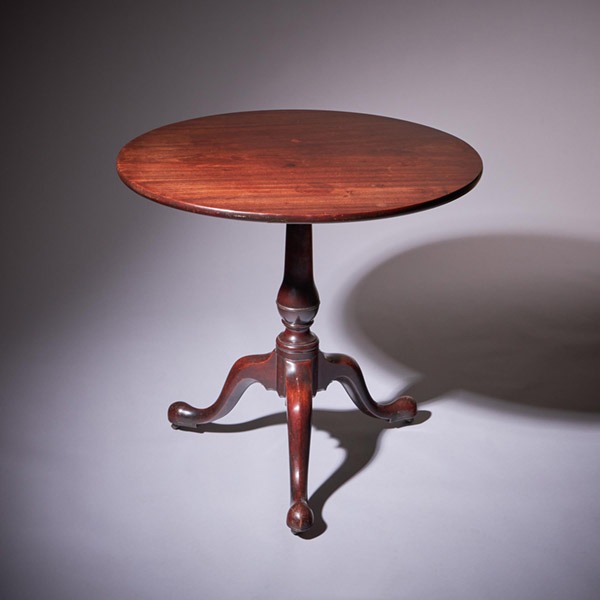
18th Century George III Mahogany Tripod Table, Circa 1770
18th Century George III Mahogany Tripod Table, Circa 1770 £2,200Follow Us18th Century George III...
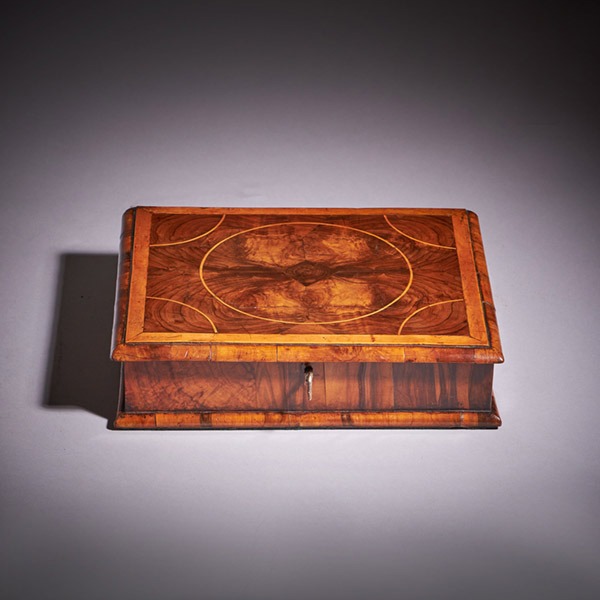
Fine William and Mary 17th Century Olive Oyster Lace Box
Fine William and Mary 17th Century Olive Oyster Lace Box £2,600Follow UsFine William and Mary 17th...
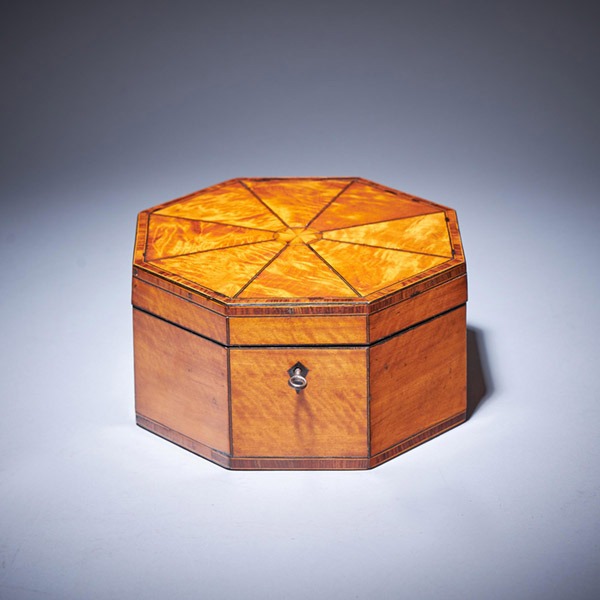
A Fine and Rare George III Octagonal Figured Satinwood Box, C.1790
A Fine and Rare George III Octagonal Figured Satinwood Box, C.1790 £2,200Follow UsA Fine and Rare...

A Rare and Important Charles II 17th Century Table Clock by Henry Jones
A Rare and Important Charles II 17th Century Table Clock by Henry Jones £85,000Follow UsA Rare and...

Important Early Edo Period 17th Century Miniature Japanese Lacquer Cabinet
Important Early Edo Period 17th Century Miniature Japanese Lacquer Cabinet £36,000Follow...

Fine Scottish Two-Day Marine Chronometer Signed and Numbered D. McGregor
Fine Scottish Two-Day Marine Chronometer Signed and Numbered D. McGregor £6,500Follow UsFine...

18th Century George III Mahogany Tripod Table, Circa 1770
18th Century George III Mahogany Tripod Table, Circa 1770 £2,200Follow Us18th Century George III...

Fine William and Mary 17th Century Olive Oyster Lace Box
Fine William and Mary 17th Century Olive Oyster Lace Box £2,600Follow UsFine William and Mary 17th...

A Fine and Rare George III Octagonal Figured Satinwood Box, C.1790
A Fine and Rare George III Octagonal Figured Satinwood Box, C.1790 £2,200Follow UsA Fine and Rare...
